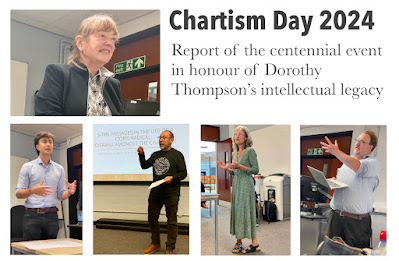Chartism Day has now been in existence for two or three times as long as Chartism itself was around (depending on how you define being around). But every year brings new research and fresh ideas. This year’s event, which took place at the University of Reading at the weekend was no exception.
I have now written a full report (with photos) for the Society for the Study of Labour History website. You can read it here.
The fact that the day continues in such robust good health after thirty years is due in no small part to Dorothy Thompson, the great historian of Chartism who inaugurated the event and played a prominent part in its early years.
This year’s Chartism Day marked Dorothy Thompson’s centenary. Some of those at the 2024 event recalled that she could be a fairly intimidating figure. ‘Formidable’, noted Dr Joan Allen, who has for many years been convenor of the event. She recalled that she sat at the back and tried to look inconspicuous the first time she attended. Another speaker said they had been ‘terrified’ at talking to her.
But they also recounted stories of the interest she took in new research, asking probing but helpful questions to their benefit.
Dorothy Thompson’s legacy to Chartism is (at least) two-fold: she was an absolutely groundbreaking historian in leading a reassessment of the part of Feargus O’Connor, of women in Chartism, and much else besides; and in creating Chartism Day she established a mechanism and a forum through which the study of Chartist history could continue to refresh itself. One historian present at the weekend remarked that there was probably not a single historian working on Chartism over the past quarter of a century who had not been to Chartism Day - and most likely presented a paper there.

No comments:
Post a Comment
Note: only a member of this blog may post a comment.